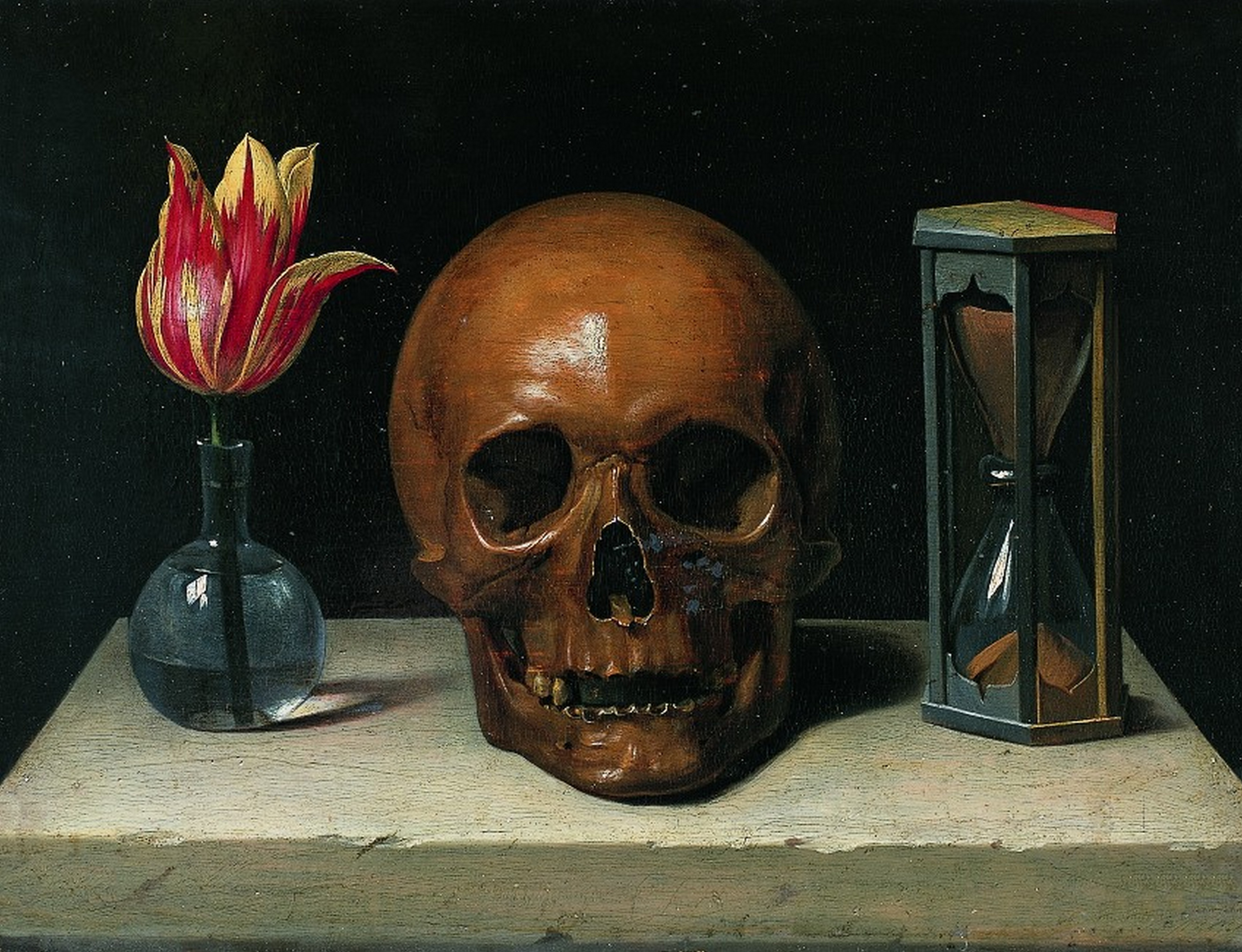 |
| Still-Life with a Skull (vanitas painting) by Philippe de Champaigne, circa 1671. [Public domain], via Wikimedia Commons. |
 Man's Search for Meaning by Viktor E. Frankl
Man's Search for Meaning by Viktor E. FranklMy rating: 5 of 5 stars
I mistakenly read Frankl's sequel to this book back in December 2016. In Man's Search for Ultimate Meaning, Frankl focused on the "existential vacuum" and psychological concepts in some detail. I barely recall this work and when I looked at it just now, the lack of pencil markings in the book means I cannot recall the parts that resonated, or the ideas I wrote about in my (rather short) review of the sequel, I also discovered that the key concepts relating to logotherapy were outlined, but I had no recollection of logotherapy, Frankl's "Austrian School" of psychology. Man's Search for Meaning is in two parts. The first part outlines Frankl's experience as a prisoner at Auschwitz and other concentration camps during World War II. He does not go into the detail of the horrors there, but focuses on how people coped or didn't cope with suffering. The word "suffering" is important in that, if one has no choice but to suffer, then suffering can give purpose to life. In the second part, Frankl outlines his logotherapy in some detail. How does logotherapy fit in with Freud and Adler? Freud focused on man's (sic) will to pleasure; Adler focused on man's (sic) will to power (obviously drawing on Nietzsche); whereas Frankl draws on man's (sic) will to meaning as a central element of human behaviour, happiness, and self-actualisation (somewhat in the Maslow sense of the word, but Abraham Maslow is not mentioned). Some quotes are worth noting:
...unnecessary suffering is masochistic rather than heroic (p. 148).
Live as if you were living for the second time and had acted wrongly the first time as you are about to act now (p. 151).
...happiness cannot be pursued; it must ensue (p. 140).
...man (sic) is ultimately self-determining... [He] has [good and bad] potentialities within himself; which one is actualized depends on decisions but not on conditions (p. 135).
Nietzsche: ""He who has a why to live for can bear almost any how" (p. 109).
...suffering may well be a human achievement (p. 108).
...only the men who allowed their inner hold on their moral and spiritual selves to subside eventually fell victim to the camp's degenerating influences (p. 78).
I found this book disturbing: enlightening, enraging, sad, hopeful, empty, full, academic, spiritual, contradictory, confronting, conservative, even judgemental. But it made me think deeper than I may have thought before. And there are techniques, too, for dealing with "anticipatory anxiety" - "hyper-intention" and "hyper-reflection". (Put simply, the paradox that the harder we try to make something work, the more we psych ourselves out. In certain cases, one can use this paradox to have a positive effect. Frankl gives the example of a man who sweats profusely, and the more self-conscious he is, the more he sweats. Frankl has the man say to himself "I will show them how much I can sweat!" and paradoxically, he doesn't sweat at all.) This paradox serves another purpose in the pursuit of meaning:
What is called self-actualization is not attainable at all, for the simple reason that the more one would strive for it, the more he (sic) would miss it. In other words, self-actualization is only possible as a side-effect of self-transcendence (p. 114).
This leads to what I think is Frankl's most important lesson:
Ultimately, man (sic) should not ask what the meaning of life is, but rather he must recognize that it is he who is asked (p. 113).
From what I can gather, in Man's Search for Meaning, Frankl outlines how his experience in the concentration camps helped him refine his concept of logotherapy, something he had written about and was writing about before he was taken prisoner. He mentions modern problems concerning the "existential vacuum", in particular, "boredom". But it is not until Man's Search for Ultimate Meaning that this is covered in more detail. I say as far as I can work out because there is a lot to comprehend in these two books, and the disturbing nature of the original (now classic) work continues to haunt my sleep, let alone coming to grips with the details of logotherapy that I was quite able to overlook through my ignorance and poor reading technique the first time around. As Epictetus said: if you would learn, be prepared to look the fool. A key lesson learnt from this experience is in comparing my current reading technique to what I was doing back in 2016; the improvement is palpable. Mortimer Adler was right and I am glad I overcame my resistance to marking and taking notes in my books. Another lesson is that a single reading of a book may not be enough, especially when subject matter that is new to me is readily over-looked. Yet, much like asking myself "What is the meaning of my life?", I need to ask myself "What is the point of my reading?". The answer is rather simple: it is to learn. Maybe I can draw on the hyper-intention paradox technique: I can tell myself that my life has no meaning and wait for meaning to appear. Or better yet, I can live the rest of my days as if it really were a second chance, and let my learning allow happiness to ensue. The real paradox is that it has been happening already without me even trying. And while I doubt I can understand Frankl until I have finished reading Nietzsche and made a start on Wittgenstein, there is enough in this book (in particular, the quotes outlined above), to keep me going for some time.